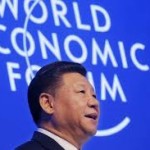Xi Jinping Reaffirms Commitment to Globalization in Recent Speech
 Chinese President Xi Jinping appeared in Davos, Switzerland this week to offer up an address before the World Economic Forum. During his speech, the Chinese leader, in stark contrast to US President-elect Donald Trump, presented a vision of an economically globalized world in which goods and services could move more freely between nations without political or economic barriers.
Chinese President Xi Jinping appeared in Davos, Switzerland this week to offer up an address before the World Economic Forum. During his speech, the Chinese leader, in stark contrast to US President-elect Donald Trump, presented a vision of an economically globalized world in which goods and services could move more freely between nations without political or economic barriers.
Xi’s address included a direct mention of the concept of free trade, or the non-taxed trade of goods between nations. Also on the Chinese president’s agenda for the world’s economic future was avoiding a trade war with anti-globalist powers in the West. Such a trade war, he implied, would benefit no nation in the long run. Despite the fact Mr. Xi was clearly speaking to the incoming Trump administration, the Chinese president declined to mention Mr. Trump by name and took a largely calm and subdued approach to presenting his message.
The speech was pointedly timed, given that it was delivered only three days before Mr. Trump is set to be inaugurated as the new sitting president. During both his primary and general election runs, Trump consistently opposed free trade, blaming it for stagnation in the American economy and for a transfer of jobs, especially in the manufacturing sector, away from the United States. Trump was especially vocal regarding his beliefs that trade with China and Mexico was harming the United States economy. Since his election in November, the president-elect has been pressuring American businesses to halt overseas production projects and invest domestically.
Mr. Trump has not yet commented on the remarks made by Mr. Xi, though members of his staff have stated that the Trump administration will retain an American commitment to free trade. Despite this, Trump’s campaign promises included heavy tariffs on goods entering the United States from outside of its borders. China, specifically, was singled out by Trump with regards to these tariffs, with a tariff of 45 percent on all Chinese goods having been suggested by Mr. Trump at one point during the presidential campaign. Since having been elected, the incoming president has toned down such rhetoric, suggesting much more measured approaches to tariffs and trade barriers in general.
The anti-globalism movements against which Mr. Xi spoke during his address in Davos, however, are far from confined to the United States or to the political right. In the American presidential electoral cycle, Democrat Bernie Sanders, who was denied his party’s nomination in favor of Hillary Clinton, espoused similarly protectionist positions. In Europe, where various populist leaders are rapidly gaining traction, globalism has also been seen as an economically nonviable model for the future. Britain’s withdrawal from the European Union, too, has been widely viewed as a criticism of economic globalization, though other issues were also involved in the decision to split with the European bloc of nations.
Xi Jinping was joined in many of his sentiments by outgoing US Secretary of State John Kerry, who also attended the forum. Mr. Kerry echoed Mr. Xi’s commitment to free trade between nations. Current American President Barack Obama has long been a proponent of free trade, having been one of the principal sponsors of the Trans Pacific Partnership, a free trade treaty agreement that would have established tariff-free trade between nations throughout the Pacific rim.
The World Economic Forum began on January 17th, the day Mr. Xi gave his address to the assembled representatives, and will conclude on January 20th. The forum is an annual meeting of leaders from both the public and private sectors intended to promote dialogue about the state of the global economy and to spur innovative solutions to economic problems. At the moment, the merit and benefit of globalization is widely considered to be one of the most pressing economic issues facing the world today. The annual meeting will also be followed up by a series of meetings later in the year regarding the economic states of various regions, including Latin America and Africa.